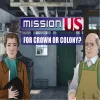Take a look inside 3 images
Mission US: For Crown or Colony?
Pros: Interact with famous historical figures while deciding your character's fate.
Cons: The game seems biased toward patriots, even while encouraging kids to make their own choices.
Bottom Line: This online game immerses kids in history by letting them make the choices people living in the 1770s would have made.
Mission US: For Crown or Colony? takes place in a series of chapters. Each one has tasks to be completed, people and objects to interact with, vocabulary words to learn, and key concepts to understand. These are all outlined at length in the Educator's Guide. These natural breaks allow teachers to assign a chapter at a time, perhaps during a class period. The game can be saved at any point, except during a dialogue, and kids can return to make different choices.
Students must register to play the game. It asks for a username, password, password reminder, and city. Educators may want to pre-register students to save time and maintain a record of login information.
Looking for a way to make the American Revolution seem more real? Want to let kids practice making life decisions and learn the consequences?
Mission US: For Crown or Colony? is an interactive experience that allows students to explore colonial America in 1770s Boston, just prior to the Revolutionary War. They take on the role of Nat Wheeler, a young printer's apprentice. As the kids follow Nat's journey, they meet historical characters such as Paul Revere and Phillis Wheatley. They also learn about the political beliefs of the time and are asked to make choices about Nat's journey.
The game is narrated with snippets of animation, and kids are often able to click on and explore the environment. In doing so, they can learn more about the printmaking business, pre-Revolutionary War American culture, and politics. The overall path through the game is mostly linear, but kids are given the freedom to perform tasks and visit locations.
The game is a fun way for students to begin to understand the 1770s political climate, although the patriot characters are generally more pleasant to interact with than those who support the crown. It lends a certain bias to the game over and above the fact that students likely already know the war's outcome. Kids will weigh their options, navigate friendships, and eventually choose sides, as they do in real life. Unlike the other Mission US title, Flight to Freedom, decisions made during the game seem to have little impact on the final outcome. In the end, students will find themselves pondering the same decision regardless of their actions throughout.












